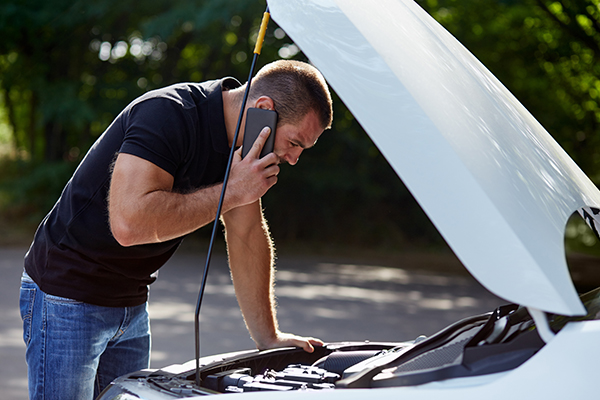
Services Overview
One of the things that make Petty Motorworks stand above some of our competitors is our ability to diagnose your concern quickly and accurately. We spend long hours learning new systems and troubleshooting techniques. Tom’s record as an advanced troubleshooter is well known in the area and he shares these skills with his team. All too frequently we see countless dollars spent in an attempt to correct a concern all because there was not a good diagnostic strategy or the diagnostic skills needed just were not present.
At Petty Motorworks, you can be assured that you are in extremely qualified hands and we always guarantee our diagnosis.
SYMPTOMS OF TRANSMISSION TROUBLE
Whining and Clunking
This may seem fairly obvious, but those are often the symptoms we ignore the most. When your car starts making noises it shouldn’t be making, it’s time to get it checked out. You’ll probably hear a humming or buzzing coming from your transmission. When this happens, don’t wait to bring it in. Fix it as soon as possible before any further damage occurs.
Problems starting the engine.
Your car either takes a long time to start, or the car simply won't start at all.
There are a number of reasons which can cause a car engine not to start, the most common, of course, being a dead battery. Pay special attention to the noise it makes when you turn the key. Is the car completely silent? If so, there may be a problem with your battery terminal cable connections. Does your car crank over but not start? Then it may be your spark plugs or fuel supply to your engine. In any case, if you're out on the road, try jumpstarting your car and then investigating the cause further when you're safely back at home.
Air conditioner not working
Your air conditioner will switch on, but you notice it's just blowing room-temperature air around rather than cold air.
The most likely cause of this is that there is no refrigerant left in your system. This could be caused by a leak in your system somewhere, which will have to be fixed before refilling the refrigerant. If you're car-savvy and you own a set of air conditioning gauges, refilling the refrigerant is usually easy to do yourself. However, if you're not so confident, enlist the help of a knowledgeable friend or take a quick trip to the mechanic.
Leaking Fluid
Fluid where it shouldn't be is one of the easiest symptoms to spot. The best way to find where the leak is coming from is to lay down a few pieces of cardboard when the car is parked. Then slide out the pieces to see just where your car is leaking. Be sure to share this information with the mechanic or service professional when you take it in to be resolved.
Grinding Gears
This symptom manifests itself differently for manual and automatic transmissions. For manual transmissions, when you change gears and you hear or feel a sense of grinding; it may mean that you have just worn out the clutch and you need to replace it. But it can also mean that one of the transmission’s synchronizers is worn out and damaged. For automatic transmissions, a rough shift rather than an unnoticeable one could be caused by a few things. Take it to a professional to diagnose.
Noisy in Neutral
A bumping sound doesn’t necessarily evoke signs of caution or trouble unless it happens when your car is in neutral. Don’t worry though; this problem can sometimes be easily fixed by replacing the transmission fluid. If however, you continue to hear noises coming from your transmission while it’s in neutral, take it in to see what’s up.
Dashboard Lights
"SERVICE ENGINE SOON." Aren't those the last words you want to see when you get into your car? This sign on your dashboard could mean all sorts of things and should definitely not be ignored. There are sensors placed throughout your car's engine that can pick up the slightest of problems. Don't procrastinate when you see this, get your car inspected as soon as you can.
Identifying certain problems with your car isn't always the easiest thing to do. Remember, if you hear or feel something that you think is abnormal; don't wait to see if the problem goes away. Make sure to get your car checked out before any further damage occurs. Not only will it save you time and trouble, but it could also save you and others from a disaster on the road.
COMMON SYMPTOMS
The problem: Uneven tire wear
Recognize it: It may not be obvious when driving that your car's tires are unevenly worn, but worn tires can be dangerous due to their reduced grip on the road. A quick check will tell you if your tires are worn unevenly. The easiest way is to jack up your car and inspect each tire individually, noting whether there are any bald spots on the inside or outside of the tire, or whether there are any dips and dents in the tire tread.
Fix it: Rotating your tires and having your wheels aligned regularly.
In terms of how often you should get your tires rotated, it's different for every vehicle and type of tire, but having them rotated at every oil change is a good rule of thumb. Check with the tire manufacturer for a more specific time frame. Remember that the more often you rotate your tires, the more evenly they'll wear, and when you have the tires rotated, you should also get them checked for balance and alignment.
Engine overheating
You may notice steam or smoke coming from under your hood, or the needle on your engine temperature gauge may be through the roof.
Overheating can be caused by a few different factors. The simplest cause may be that your car needs more coolant. Yet depleted coolant can be caused by bigger problems, like leaks or faulty hoses, so always check for the underlying cause before simply filling it up with more. Another common reason for overheating may be that the radiator fan which keeps your engine cool is faulty, so check your fan motor connection and fan thermostat.
Noisy brakes
You'll know it when you hear it!
There could be a number of reasons for noisy brakes. It could be that your brake pads are loose, worn out, or you may have brake dust inside the drum. If you can't see anything wrong with your brake pads, and you suspect it may be brake dust, it may be best to leave this to a professional - brake dust can be extremely dangerous if accidentally inhaled.
Always remember, if you don't feel confident tackling your car troubles on your own, take your car into our shop and we will get you back on the road in no time. Also, don't forget to take care of the outside appearance of your car, as well as the inside - a little DIY waxing and car detailing, will help prevent aesthetic problems (like rust and worn-out interiors) later down the track.
Defective battery
Batteries made of lead or acid may last and work properly for about five years. Eventually, because of regular use especially during short travels, failures may arise to terminals as well as to clamp connections. To tune-up, the clamps and terminals must be checked. Using lubricants like grease or petroleum jelly can protect the terminals against corrosion.
There are maintenance-free batteries nowadays that do not call for replenishment. However, during short travels, the function of batteries can be extended through overnight charging. When the battery is not working, one common solution is to jump the vehicle's battery with the aid of another car. But, this is a serious and dangerous task since batteries generate highly combustible gas. With a simple spark, the gas can be ignited and can lead to an explosion. Worse is the corrosive acid being showered to the person doing the job. Therefore, it is better to wait for others' assistance.
Damaged or Flat Tires and Wheels
Driving whether short or long distances would be faster and easier using effective tires and wheels. Impacts and harsh elements can produce damage to in wheel rims or sidewalls. Wearing irregular tires can also be experienced due to wheel misalignment. To be ready during unexpected circumstances, always consider an extra tire. Additional repair tools are a lot of help in handling emergencies. Consulting a tire specialist would also be beneficial so as to restore the good performance of the and wheels.
Fuel problems
It is important to not let tanks run of fuel as drained fuel tanks can be a recipe for car problems. In some cases, leaking pipes, faulty injectors, busted pumps, or thwarted carburetor jets can also be encountered. Though pipes can be temporarily made during urgent situations, replacement is still a very good decision.
Dashboard Lights
"SERVICE ENGINE SOON." Aren't those the last words you want to see when you get into your car? This sign on your dashboard could mean all sorts of things and should definitely not be ignored. There are sensors placed throughout your car's engine that can pick up the slightest of problems. Don't procrastinate when you see this, get your car inspected as soon as you can.
Identifying certain problems with your car isn't always the easiest thing to do. Remember, if you hear or feel something that you think is abnormal; don't wait to see if the problem goes away. Make sure to get your car checked out before any further damage occurs. Not only will it save you time and trouble, but it could also save you and others from a disaster on the road.
